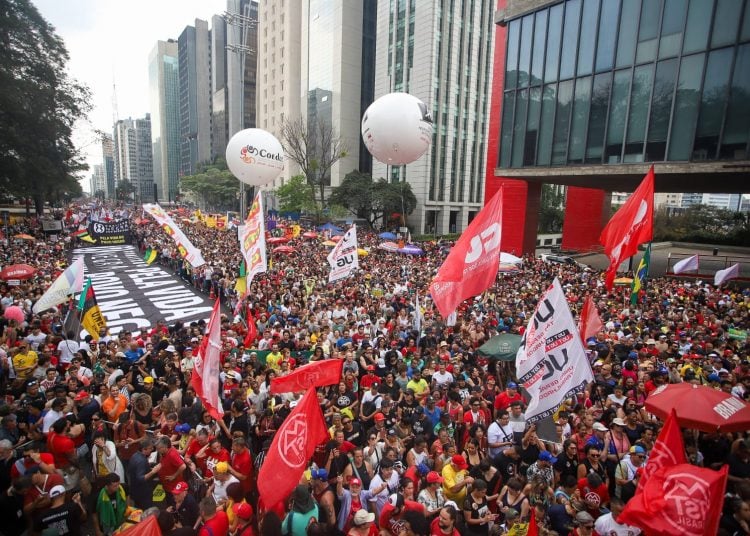The protest had not even officially begun when Paulista Avenue, São Paulo’s most famous boulevard, was already packed on Sunday (15). By early afternoon, crowds filled the blocks surrounding the Museum of Art of São Paulo (MASP), carrying banners, drums, and chants against two controversial measures moving through Congress: a constitutional amendment that would shield lawmakers from investigation, dubbed the “Impunity Amendment”, and a bill that could reduce sentences or even pardon those involved in the January 8, 2023 coup attempt.
Not even the heavy rain that fell mid-afternoon was able to scatter the demonstrators. Organizers estimated that hundreds of thousands gathered in São Paulo alone, while rallies erupted in at least 19 state capitals across the country. For many, it was the largest progressive mobilization since the return of democracy in the 1980s.
‘The Brazilian spring of struggle’
Leaders of Brazil’s popular movements framed the day as a turning point. “This is the beginning of the Brazilian people’s spring of struggle,” declared Gilmar Mauro, of the Landless Workers’ Movement (MST). “By the end of the day, we will be able to say that millions took to the streets against amnesty for coup plotters, against the Impunity Amendment, and to bring workers’ demands back into the national debate.”
Federal deputy Guilherme Boulos echoed the mood: “Today is a historic day. The Brazilian left has reclaimed the streets. And now things are clear: there are two projects in dispute. Ours says politics must serve the people, not the other way around.”
The rally was colorful and diverse. Alongside party and union flags, homemade signs denounced congressional corruption, remembered victims of dictatorship-era amnesties, and criticized environmental rollbacks.
On the avenue, participants shared their anger and frustration. “We fought so hard for a Constitution that respected people’s rights, and now these lawmakers only care about protecting themselves,” said lawyer Glaucia Avellar. “Politicians only fear people in the streets. That’s why I came.”
Public administration worker Valéria Ferreira warned against repeating history: “Amnesty is a disgrace. Brazil’s recent past shows that it doesn’t work. They always come back. Many of those asking for amnesty today supported the dictatorship decades ago.”
Public outrage focused not only on impunity but also on the legacy of dictatorship. The proposed amnesty revived memories of the 1979 Amnesty Law, which pardoned torturers and regime officials and, in the eyes of many, paved the way for Bolsonaro’s rise.
A message to Congress
The protests sent a strong signal to Congress. Federal deputy Sâmia Bomfim declared: “After today, the Impunity Amendment will be buried.” In the Senate, rapporteur Alessandro Vieira has already promised to recommend rejection, calling the proposal a threat to Brazilian democracy.
The same message applied to the amnesty bill. “Those who attacked our democracy will not be pardoned,” said left-wing federal deputy Erika Hilton. “For the first time, Brazil has a chance to break with its history of pain and inequality, marked by impunity for coup plotters.”
She spoke directly to the former president: “Bolsonaro, you will go to jail. The people who carry this country on their backs don’t want amnesty, don’t want impunity. They want food, wages, rest, equality.”
Music and memory
As Paulista Avenue began to empty, music filled the streets of Rio de Janeiro. On Copacabana Beach, Caetano Veloso led a rally alongside Gilberto Gil, Chico Buarque, Djavan, and other legends of Brazilian music. The performances evoked the spirit of the 1968 “March of the 100,000” against dictatorship. “We’ve lived through moments like this before,” Gil said. “This is one of those moments again.”
In Salvador, singer Daniela Mercury and actor Wagner Moura danced on top of a sound truck before a crowd that filled the Morro do Cristo waterfront. Moura told the demonstrators: “No amnesty. It was that law of amnesty, in a country that insults its own memory, that gave us Bolsonaro. This cannot ever happen again.”
By the end of the day, rallies had been recorded in at least 19 state capitals. From São Paulo to Rio, from Salvador to the Amazon, the message was the same: no impunity, no amnesty, and no return to the days of dictatorship.




